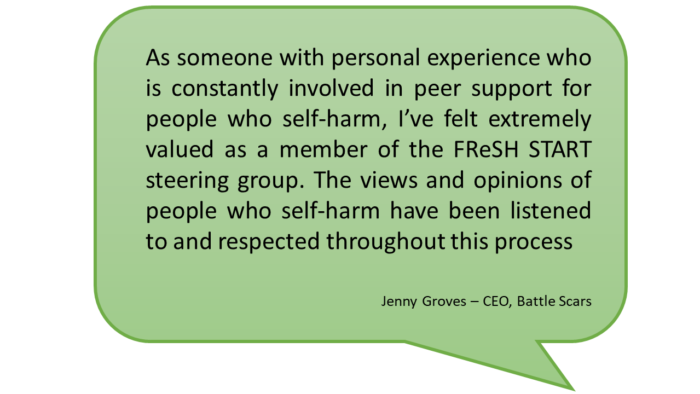Public and Patient Involvement (PPI)
PPI Involvement and FReSH START
The involvement of people with personal experience is central to our work. We have worked in partnership since the very beginning and PPI involvement has helped shape the programme of work for FReSH START. We have PPI oversight in our Steering Committee, as well as PPI representatives on the programme management group. We want our new therapy to be of value and we believe that working in partnership with people with personal experience is key to making that happen.

Most importantly, people with personal experience have worked with us to develop our new therapy. Towards the end of 2019, we held a series of workshops in Manchester which brought together people with personal experience and therapists. Workshop participants discussed the study’s findings so far and shared their thoughts on what the therapy should look like. This feedback has helped to shape the therapy we have developed for the trial.
You can read more about co-production in the FReSH START study in this essay, co-authored with Natalie Mark, a peer researcher and a lived experience advisor:
In it together: where research and real world experience meet (leeds.ac.uk)
Our Lived Experience Group
We set up a Lived Experience Group in 2021 to build on the PPI work we had done up to that point. The group supports the FReSH START project in numerous ways. Members of this group give feedback on research materials, attend workshops to discuss how the research is going, and take part in the trial management group meetings. The group also helps us to plan for the next steps.
We are currently looking to add new members to the group who we would like to invite to take part in two upcoming workshops. These will take place towards the end of 2024 and early 2025. You can find out more here Opportunity to collaborate in research - FReSH START
If you would like to find out more about being part of our Lived Experience Group, contact Tom or Charlotte on freshstart@leeds.ac.uk
Diversity and Representation in Research
Unequal representation of diverse groups in mental health research is a long-standing problem that can reinforce inequalities in mental health care. This can affect many different groups, such as people from ethnically diverse communities, disabled people, LGBT+ communities and people from lower income households.
We know that there are many reasons why people are reluctant to access services, or feel that services are inappropriate for them, such as stigma, culturally inappropriate advice or previous negative experiences. If this has been your experience, you may also be reluctant to get involved in mental health research. However, in order to address these issues and improve mental health services for everyone, we need to hear your voices too.
Satveer is from the South Asian community, and has personal experience on self-harm and accessing mental health services. She spoke to us about some of the challenges she faced, coming from the South Asian community, and why it is so important for people from all backgrounds to get involved in research and ensure their voices are heard as well. Have a listen to what she had to say.
Third Sector
We have also been working with a number of third sector organisations to help gain a better understanding of the wider picture in relation to self-harm. This input has been very valuable in terms of further representing the voices of people with personal experience, as well as understanding where the gaps in services are, and where people need support. This has been particularly important during the COVID-19 crisis, as third sector organisations have seen a sharp rise in people contacting them for support.
Marsha McAdam, PPI representative on the FReSH START project, spoke to Jake Mills, from Hub of Hope, about the role of people with lived experience and third sector organisations in providing support for people who struggle with their mental health.
